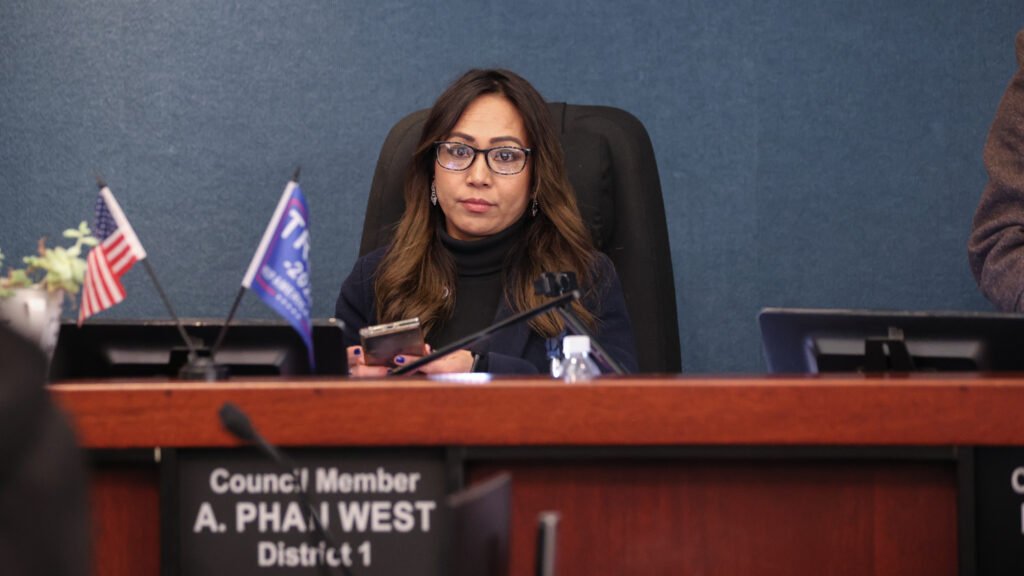An Orange County Councilwoman Faces Legal and Ethical Controversy
As the sun dipped beneath the horizon in Westminster, California, a group of residents gathered outside the Orange County Superior Court, their faces a tapestry of concern and discontent. Among them stood Terry Rains, a local citizen who asserted with palpable frustration, “The defendant abused her political power.” This scene unfolded as Westminster City Councilwoman Amy Phan West appeared before Judge Sherri Honer, following charges of attempted bribery that sent ripples through the community.
The Case Unfolds
In February, Phan West pleaded not guilty to allegations of trying to bribe parking enforcement officers to avoid her husband’s car being towed. This incident occurred in 2023, setting the stage for a courtroom drama that has ignited local sentiment.
On Monday, Judge Honer authorized a diversion program which mandates that Phan West undertake 20 hours of community service, complete an in-person ethics training course, and donate $500 to a victims’ fund. Such programs are designed to provide an alternative to a traditional trial, particularly for first-time offenders like Phan West, who has no prior convictions.
“Ethics training should be a cornerstone of every elected official’s journey,” said Judge Honer as she laid out the expectations of accountability intertwined within public service.
The Community Reaction
The courtroom walls echoed with emotions as around a dozen residents opposed the diversion program, echoing similar sentiments of disappointment and betrayal. Rains, who rallied support from over 100 signatories, emphasized the community’s collective disillusionment, stating, “The gravity of this offense has eroded our trust in local government.” Critics argue that letting her circumvent a jury trial undermines the integrity of the office she holds.
- Accountability: The diversion program is seen as an insufficient response to the seriousness of attempted bribery.
- Impact on Trust: Residents claim that this incident reflects a broader pattern of misuse of power.
- Community Division: The case has polarized the community, highlighting the divide between supporters and opponents of Phan West.
The defense maintained a contrasting narrative. Phan West’s attorney, Randy Collins, articulated a notion of innocence, arguing that participation in the diversion program represents a pragmatic solution, thwarting an expensive jury trial. “This resolution respects taxpayer dollars while allowing Councilwoman West to maintain her innocence,” he stated outside the courthouse.
A Broader Perspective
Expert opinions vary, providing multifaceted insights into the implications of such cases on local governance. Dr. Eleanor Hayes, a political scientist specializing in public ethics, noted, “When elected officials face allegations of misconduct, it not only tarnishes their credibility but also that of the entire institution.” She advocates for robust ethical training as a preventative measure. A hypothetical study from the University of California suggested that municipalities with comprehensive ethics training programs experience 30% fewer corruption allegations annually.
Political Undertones
Amidst the legal saga, some voices have pointed to possible political motives fueling the backlash against Phan West. Supporters, including fellow Councilman NamQuan Nguyen and trustee Ryan Bent, voiced opinions that the case has been overblown and politicized, indicating a necessity for balance in the public discourse surrounding her conduct.
Bent commented, “This case has an element of political motivation,” trying to shed light on how personal biases can distort perceptions of accountability. However, the fervent dissent from local residents paints a different picture—one of palpable outrage and calls for transparency.
The Way Forward
As the dust settles from the courtroom proceedings, the future of Amy Phan West remains precarious. While her agreement to undergo ethics training and perform community service might mitigate immediate legal repercussions, the lasting effects on her political career and community trust are uncertain. Local governments thrive on the principle of integrity, and damage to that ethos often leaves indelible scars.
In a world where public figures are held under the microscope of scrutiny, the Westminster case serves as a cautionary tale—a reminder that the intersection of power, ethics, and public trust is fraught with challenges. As these events unfold, Westminster’s citizens will be watching closely, expecting accountability and a rebirth of trust in their local governance.





